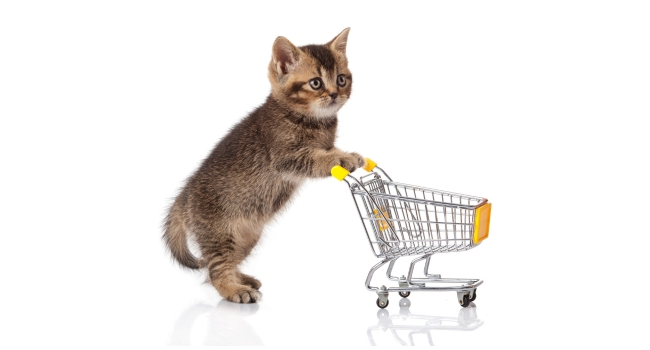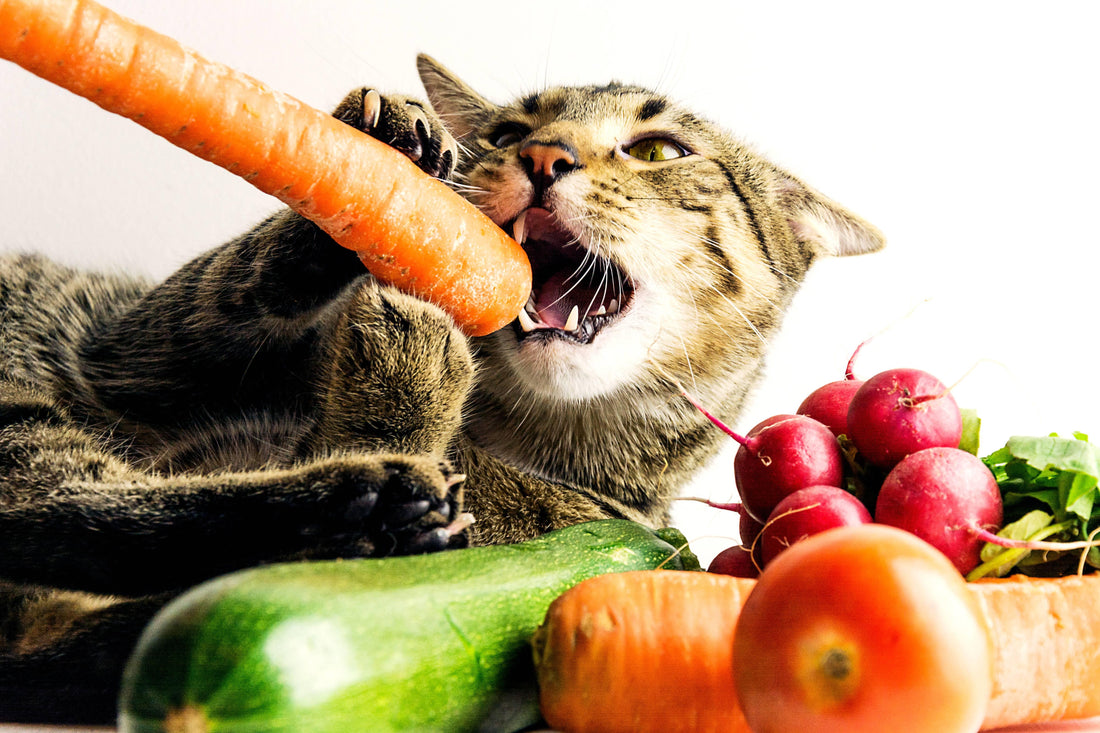You’re looking through your refrigerator and you find a can of carrots, but you aren’t sure if they are okay to give to your furry friend.
So you are wondering – can cats eat carrots? Right!
You’re not alone in this case. Many people wonder what other healthy foods they can feed their cats in addition to their regular cat food.
Don't worry anymore! In this article, we’ll explore what makes carrots different from other vegetables and whether your cat will love them as much as she loves kibble
Let’s find out the answers!.
What Does a Carrot Consist of?
Most people know that carrots are rich in beta-carotene, but did you also know that carrots have vitamins K and E, calcium, zinc, iron, folic acid, manganese, magnesium, potassium, and phosphorus? Not only that, but carrots have protein, carbs, sugar, and fat in them too.
Can Cats Eat Carrots?
The short answer is yes, but there are a few caveats to the rule that need to be addressed before you start plopping them down in front of your pet as a snack.
First and foremost, carrots are safe for cats in small quantities. Cats have different nutritional needs than humans, so don't replace your pet's food with a carrot as a meal.
Carrots can be given as treats periodically, but nothing more than that because the cats are obligate carnivores and need meat protein for their growth.
Are Carrots Nutritionally Beneficial to a Cat?
The truth is that cats are obligate carnivores and cannot get enough benefits from carrots. While carrots are a good source of vitamins and minerals, it is not the best option for your pet.
In addition to proteins, cats need vitamins and minerals to stay healthy, but carrots are root vegetables and cannot be digested properly by our feline friends. Therefore, carrots do not provide any nutritional benefits to cats.
What is the Best Way to Serve Carrots to Cats?
It's okay to feed carrots to your cat now and then as a treat. Here's what you need to know when serving carrots to your cat:
- Make sure to wash the carrots well.
- Skin must be peeled.
- Boil carrots in water until they're soft.
- Let them cool off before serving.
- Only serve in a small quantity.
My Cat is Eating Carrots, How Much Should she/he Eat?
Cats are carnivores, so they don't need a lot of vegetables to stay healthy and happy. However, that doesn't mean it's not important to provide them with some!
Generally speaking, 2-3% of your cat's daily food intake can come from carbs like vegetables and grains. If your cat likes carrots, serve them sparingly once every few weeks. No more than 4-5 grams a day!
Are Carrots Safe For Kittens?
Kittens can start eating solid at around 3-5 weeks of age. For their proper development, kittens require more protein than adults because they are still growing and need more energy.
In general, a kitten's diet should contain higher amounts of protein, fat, and vitamins. Carrots can't provide these nutrients, so they need an animal-based protein diet.
Can Cats Eat Raw Carrots?
Carrots can be a treat for your kitty when cooked properly but it is best to avoid feeding your pet raw carrots. Raw carrots are hard to digest and have the potential to lead to choking if swallowed whole or in large chunks.
Can Cats Drink Carrot Juice?

You should only give homemade carrot juice if you want to. But these juices cannot provide any nutritional value to your pet, so do not make this a regular occurrence in their diet.
Are Carrots the Favorite Food for Cats?
The sweet taste of carrots may make us think that our pets enjoy eating them, but this isn't true.
The study suggests that cats are sweet blind and cannot enjoy eating carrots or other sweets because their tongues aren't able to identify sugar as a sweet flavor.
If your cat enjoys eating carrots, it may just be that they like the texture or color of them better than any other food item.
If Cats Eat Carrots, What are the Risks?
It’s possible to give your cat carrots, but excessive consumption may be harmful. Unlike people, cats aren’t able to digest a large amount of vegetables.
Cats lack specific digestive enzymes that would allow them to properly digest certain foods, such as carrots.
As a result, these foods can pass through their system undigested—which is dangerous because they could lead to certain health problems.
The following problems may occur in your cats if they eat carrots:
- Choking Hazard
- Gastrointestinal Problems
- Risk of Obesity and Diabetes
Choking Hazard
Despite their reputation as one of the healthiest vegetables around, carrots can actually be dangerous for cats because they can get caught in their throat.
If you have to feed your pet carrots occasionally, watch him closely when eating them. Like most veggies, such as broccoli or pumpkin, it’s best to cut them into small pieces so they’re easier to chew.
Gastrointestinal Problems
Cats might have some gastrointestinal problems after consuming an excessive amount of carrots.
Here are some of the most common symptoms of GI problems in cats:
- Diarrhea
- Vomiting
- Dehydration
- Abdominal pain
- Fever
- Lethargy
- Loss of appetite
Risk of Obesity and Diabetes
Many of us are aware that carrots are a low-calorie food for humans, but this does not mean that it's the same for your furry friends.
Carrots have enough calories and sugar to have an effect on your cat's health if consumed in excess, including causing obesity and diabetes.
Cats that have diabetes may exhibit the following symptoms:
- Excessive thirst
- Increased urination
- Weight loss
- Vomiting
- Lack of appetite
- Inability to jump
Can Cats Have Allergic Reactions to Carrots?
It is very rare for cats to be allergic to carrots, but it does happen. Signs of an allergic reaction to carrots in cats include:
- Difficulty breathing
- Sneezing
- Coughing
- Vomiting
- Diarrhea
- Runny nose
- Watery eyes
- Itching
- Skin rashes
- Face swelling
What Other Vegetables are Safe for Cats to Eat?

Cats are obligate carnivores and require meat in their diet. However, moderate consumption of the following fruits and vegetables is acceptable, but a high quantity should be avoided. Although these fruits and vegetables may not offer nutritional benefits to felines:
- Asparagus
- Broccoli
- Beetroot
- Bell Peppers
- Cabbage
- Cauliflower
- Cucumber
- Pumpkin
- Spinach
Healthy Protein Snacks for Cats
Protein snacks like small bits of cooked chicken or a small serving of tuna will provide your cat with nutritional benefits without any risk.
There are a lot of protein snacks available to choose from:
- Tuna
- Chicken
- Cooked eggs
- Sardines
- Lean beef
- Lamb
- Shrimps and prawns
- Salmon
- Mackerel
What Foods Should I Avoid Feeding My Cat?
For people that want to share their food with their cat, make sure to give your cat healthy human snacks instead of snacks that may harm them.
Foods you should avoid giving your cat include:
- Alcohol
- Citrus fruits
- Coffee
- Coconut
- Grapes and raisins
- Dairy products
- Mushrooms
- Raw bread containing yeast
- Onions, garlic, leeks, chives, scallions, and shallots
Key Takeaways
- When carrots are cooked and sliced into small pieces, cats can safely consume them.
- If you feed carrots in excess, your cat may experience gastrointestinal problems, obesity, and diabetes.
- Raw carrots should never be given to cats.
- Be mindful that vegetables like carrots cannot provide the daily requirements of nutrients to your cats.
- Always consult your veterinarian before feeding your cat any new food.
Pro Tip:
It can be very stressful and concerning when a beloved pet is not feeling well, so it's worth it to get pet insurance to make sure you can cover the veterinary bills.
Importance of Pet Insurance
Pet insurance is a great way to protect your animal's health. It can be hard to predict when an accident will happen, but with pet insurance, you're covered.
There are a few different types of plans depending on your needs, and it only takes minutes to get coverage for your pet.
Some pet insurance companies will even cover 100% of veterinary expenses. So make sure to choose the best pet insurance plan for your furry friend.
Once you have a plan in place, vet bills will never be too high because they'll already be covered by the policy.
It's important that we all take care of our animals' safety and well-being so they can enjoy their lives just as much as we do ours.
What Makes Genius Litter Different from Ordinary Litter?

Say goodbye to hauling heavy bags and hello to easy Genius Litter.
With our innovative non-clumping litter formula, you'll need less of it. One bag of our disposable Genius Litter lasts up to a month, so you won't need to refill the box as often and can save money on monthly costs.
One thing that separates us from traditional litter is that Genius Litter changes color to indicate when your cat has a potential health issue, so you can get them help before it becomes an urgent medical situation.
All you need to do is set up a delivery date with us each month, and rest easy knowing that Genius Litter will arrive at your doorstep every 30 days.
For a convenient solution for your cat, try Genius Litter today!
Why is Lysine so Important for Your Pet?

Protect your pet's immunity!
Have you noticed that your cat is coughing, sneezing, and having rapid breathing? Or maybe he/she has been scratching more than usual?
These are all signs of a weakened immune system. One way to prevent this from happening is by using lysine supplements.
Lysine plays a key role in your pet's immunity because it helps to regulate the immune system.
Without enough lysine, your pets will be more susceptible to illness because their immune system can't fight off infections as efficiently.
When they are sick, they will also be less able to absorb nutrients and make use of other supplements that can help them feel better.
Give your pet the support they need. Our Lysine supplement provides essential amino acids to help support a strong immune system.
Order now to get 300 one-scoop servings or 150 two-scoop servings and don't worry about expiry!





